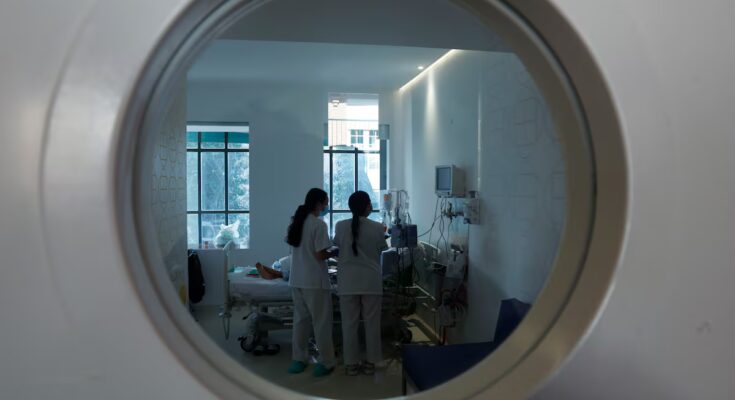“He left me until last to stay alone with me in his office and make advances”; “ask the patient if he needs anything and get the answer ‘a kiss’; “a superior approached me from behind pushing his member against my buttock, disguising it as a joke”; “During a guard shift, a superior attempted to kiss me and have intercourse with me. I didn’t go back on guard so I wouldn’t have to see it.” These are just some of the 1,500 testimonies sent to the Nurses’ Union (SATSE) reporting situations of sexual violence in the workplace. But they constitute only part of the reality that the union seeks to x-ray with a macro-survey on sexual harassment in the healthcare environment carried out among 7,387 nurses and physiotherapists across the country and presented on Tuesday.
The data, according to SATSE, are worrying: almost half of nurses (48.5%) have experienced offensive sexist comments or jokes and eight out of ten say they do not report it because they are not aware of the procedure or do not trust its effectiveness.
The majority of people who responded to the survey are women (85%) and, according to the union, the majority of the attackers they cite are men. Two in ten professionals (22%) have experienced some type of sexual violence, such as touching sensitive or intimate areas. “When I was explaining the different treatment techniques to myself, there were touches and friction in different parts of my body that I don’t consider necessary for the explanation”, is one of the testimonies. Or this one: “A tutor during my hospital practice touched me, looked at me and approached me in obscene ways.”
According to the Ministry of Equality, sexual harassment is any behavior – verbal or physical – of a sexual nature that has the purpose or effect of violating a person’s dignity. Sex-based harassment, on the other hand, consists of hostile or degrading treatment directed at a woman for being a woman. Both forms of violence create an intimidating, degrading or offensive environment. From the testimonies collected by the union it emerges that these behaviors do not only come from superiors or colleagues: patients and carers are also responsible for harassing behaviour.
These manifestations of workplace violence, SATSE points out, tend to “become normalised, silenced or made invisible”, without the attackers facing consequences. The union insists that health administrations and companies have the responsibility to ensure compliance with protocols that can improve prevention, early diagnosis, reporting and treatment of victims.
However, the union’s Equality manager, Carmen Guerrero, warns that the mere existence of a protocol does not guarantee its effectiveness: staff training and social awareness are essential, especially since this type of behavior is also normalized by patients and family members. In this context, Laura Villaseñor, president of the union, calls for the implementation of “zero tolerance” measures towards harassment, with mandatory training for all healthcare personnel and permanent awareness campaigns.
The macro survey is part of an awareness strategy promoted by the union with the motto Yes, it happens… It’s harassment. Villaseñor points out that both sexual and sex-based harassment reflect “structural inequality and an exercise of gender power” and defines them as the “most frequent, hidden and unpunished” forms of violence in the workplace.
More than a third of nurses (37%) say they have been treated differently because of gender. Between 20% and 30% report other behaviors: hearing offensive sexual stories or jokes, enduring suggestive glances, being subjected to attempts at friction or contact, or receiving requests for attention of a sexual nature, such as catcalls or humiliating compliments.
Normalization and silence in the healthcare sector
For Villaseñor, the nursing and physiotherapy group is particularly vulnerable. “Especially in the case of nursing, historically we have carried with us sexual stereotypes and stigmas that are reflected in jokes, costumes, films, advertisements…” she points out.
The survey also shows that 43.4% of professionals have experienced these situations between two and five times, while 25.2% have experienced them more than ten times during their working life. 60% say they have experienced some of these episodes in the last three years.
Guerrero explains that the lack of complaints is mainly due to lack of knowledge of existing procedures and rights (39.5%) and mistrust in their effectiveness (34.5%). 63.5% of nurses and physiotherapists do not know if there is an action protocol against sexual and gender harassment in the workplace, and only 18.8% declare having received information or training in this regard.
Indeed, scientific evidence supports this warning: a University of Calgary study, published in 2007 and based on a meta-analysis of 41 surveys with almost 70,000 participants, concludes that the factor that most influences the prevalence of sexual harassment in organizations is the perception of tolerance towards these behaviors.
Villaseñor adds that normalization in the healthcare workplace has gotten to the point that many professionals don’t know how to name what’s happening to them. In his words: “To know what happened to me and to give it a name, the first thing there must be is that awareness and that education.”
Other women, in addition to fearing retaliation, take for granted that “this has always happened” and doubt that their situation will change. This also ends up damaging them in their economy: they are the ones who often change shifts or positions to avoid attackers. These women, therefore, are also affected in their professional development, growth and remuneration. “You can’t work like this,” concludes Villaseñor.
The 016 telephone line assists victims of sexist violence, their families and those around them 24 hours a day, every day of the year, in 53 different languages. The number is not recorded on the phone bill, but the call must be canceled from the device. You can also contact via email 016-online@igualdad.gob.es and via WhatsApp on 600 000 016. Minors can contact the ANAR Foundation telephone number 900 20 20 10. In case of emergency it is possible to call 112 or the telephone numbers of the State Police (091) and the Civil Guard (062). And if you can’t call you can use the ALERTCOPS application, from which an alert signal is sent to the Police with geolocation.



